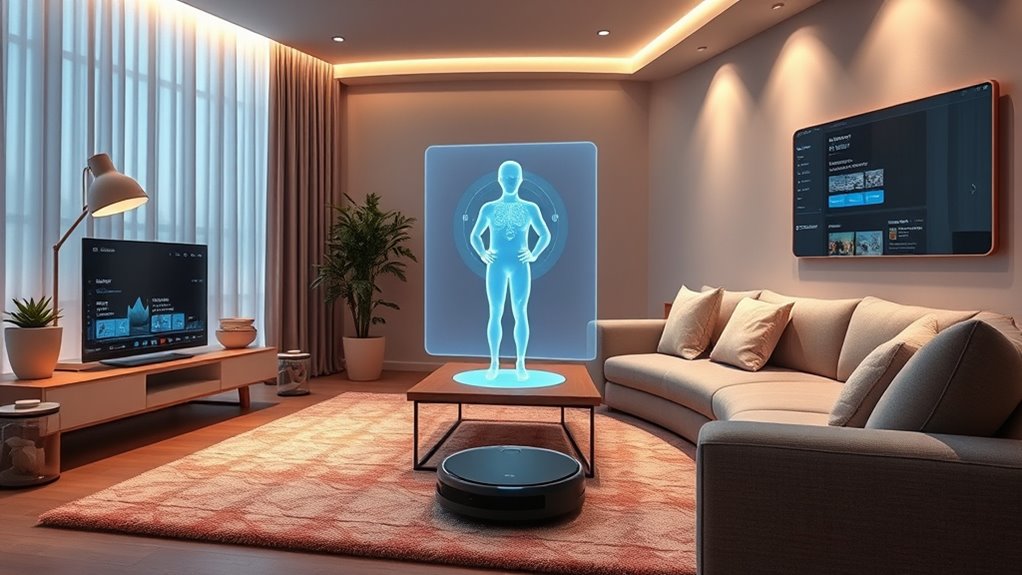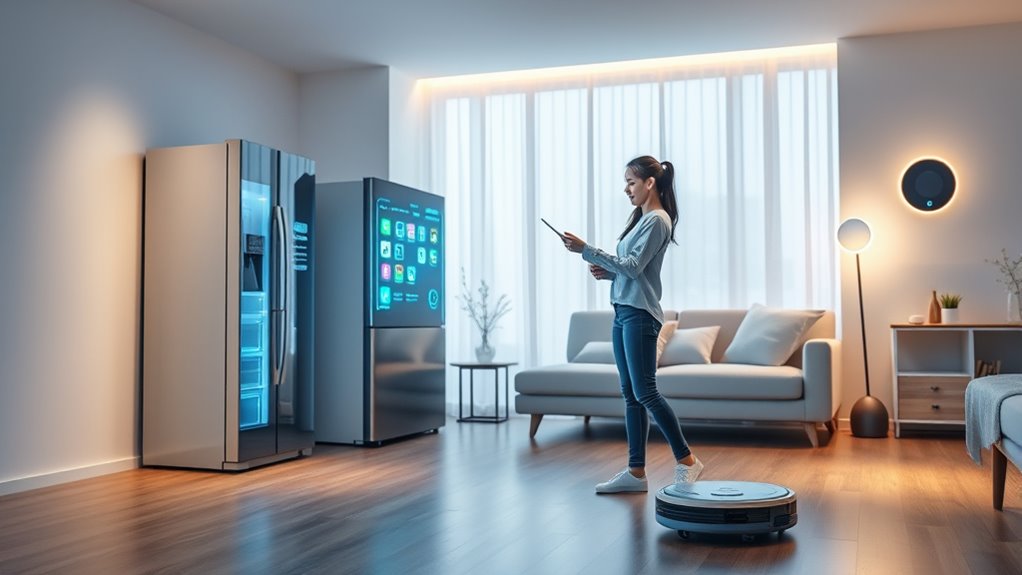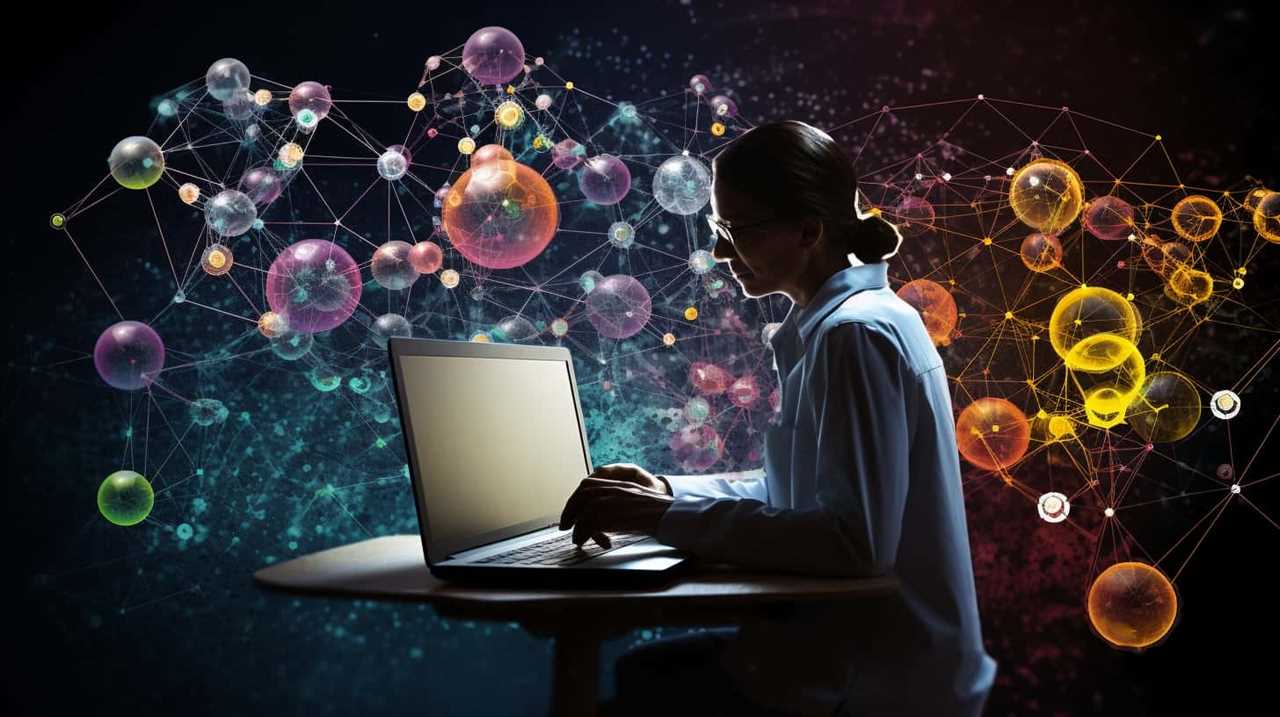By 2025, AI will seamlessly integrate into your daily routines through smarter apps and gadgets that anticipate your needs, making life more efficient and personalized. Smart home devices will automatically adjust settings based on your habits, while virtual assistants will proactively help manage your schedule, health, and entertainment. These advancements will create a more intuitive environment that adapts effortlessly to you. Continue exploring to discover how these innovations will transform your everyday experiences.
Key Takeaways
- AI-powered virtual assistants proactively manage schedules, tasks, and preferences for more personalized daily experiences.
- Smart home gadgets automatically adjust lighting, temperature, and security based on learned user routines.
- Enhanced safety features detect anomalies and environmental hazards, providing instant alerts and responses.
- Energy-efficient AI systems optimize utility usage, reducing costs and environmental impact.
- Integration of AI across devices creates seamless, intuitive environments for living, working, and entertainment in 2025.

Have you ever stopped to wonder how much artificial intelligence has become part of your daily routine? It’s likely that AI influences your life more than you realize, especially through smart home automation and personalized virtual assistants. These technologies have evolved rapidly, making daily tasks easier, more efficient, and tailored to your preferences. When you wake up in the morning, your smart home might have already adjusted the thermostat to your preferred temperature and turned on the lights to set the perfect mood. All of this happens seamlessly, thanks to smart home automation systems that learn your habits and routines over time. They connect different devices and sensors around your house, creating an integrated environment that responds intelligently to your needs. No more fiddling with multiple apps or manual controls—your home anticipates your actions, saving you time and effort.
AI seamlessly personalizes your mornings by adjusting your home environment to your habits and preferences.
Meanwhile, personalized virtual assistants have become more sophisticated than ever. These digital companions not only answer your questions but also proactively assist in your day-to-day life. Whether you’re planning your schedule, setting reminders, or searching for information, your virtual assistant understands your preferences and habits. It learns from your interactions, providing more accurate and relevant responses as it gets to know you better. For example, if you usually listen to a specific playlist during your workout, your assistant might suggest it automatically when you start exercising. Or, if you frequently order groceries online, it can remind you when supplies are running low and even place orders on your behalf. This personalization makes your digital experience feel more natural and intuitive, almost like chatting with a knowledgeable friend.
These AI-driven tools are not just about convenience—they’re also about enhancing safety and energy efficiency. Smart home automation can detect unusual activity or leaks, alerting you immediately to prevent accidents or damage. It can also optimize energy consumption by adjusting lighting and temperature when you’re away, helping reduce your utility bills and environmental impact. AI integration in your home is becoming more seamless, allowing for even smarter responses and improvements. Your personalized virtual assistant, on the other hand, acts as a central hub that keeps you organized and informed, managing your appointments, traffic updates, and even your health data.
In 2025, AI’s integration into everyday life isn’t just a luxury; it’s an essential part of how you live, work, and play. Smart home automation and personalized virtual assistants work in tandem to create a smoother, more customized experience. They anticipate your needs, adapt to your routines, and make technology feel less like a tool and more like a part of you. That’s the true power of AI in your daily life—it’s there, quietly making everything better, smarter, and more personalized.
Frequently Asked Questions
How Secure Is My Personal Data With These AI Devices?
Your personal data’s security depends on how well AI devices use data encryption and follow strict privacy policies. Many devices now employ advanced encryption methods to protect your information from unauthorized access. However, it’s essential you read privacy policies carefully and stay aware of how your data is collected, stored, and shared. Taking these precautions helps guarantee your data remains secure as AI gadgets become more integrated into your daily life.
Will AI Replace Human Jobs in Everyday Services?
AI won’t fully replace human jobs in everyday services, but automation concerns are valid. You might see some job displacement as AI handles routine tasks, freeing humans for more complex or personal roles. While AI enhances efficiency, it also creates opportunities for new jobs. So, instead of fearing complete replacement, focus on developing skills that complement AI and adapt to the changing landscape of work.
How Accessible Are These AI Gadgets for People With Disabilities?
You’ll find that AI gadgets increasingly embrace universal design, making them more accessible for people with disabilities. Developers aim to reduce affordability barriers, ensuring these innovations are within reach for many. As a result, you’ll notice improved features like voice commands, text-to-speech, and adaptive interfaces tailored to diverse needs. While some challenges remain, the trend is toward more inclusive, affordable AI gadgets that empower everyone to participate fully in everyday life.
Can AI Adapt to Individual User Preferences Over Time?
Imagine your favorite app gently evolving with you; that’s the power of personalization evolution. AI now uses adaptive learning to seamlessly adjust to your preferences over time. It’s designed to listen and learn from your habits, making your experience smoother and more intuitive. So, yes, AI can adapt to your unique needs, creating a more personalized and effortless interaction that feels almost like it’s reading your mind.
What Ethical Considerations Are Involved With Daily AI Use?
When you use AI daily, ethical concerns like privacy worries and algorithmic bias come into play. You should be mindful that your data might be collected and used without full transparency, risking your privacy. Additionally, biased algorithms can unfairly influence decisions or recommendations. To stay protected, question how your data is handled and support AI systems that prioritize fairness and transparency, ensuring ethical use aligns with your values.
Conclusion
As you see, AI in 2025 makes daily tasks easier and more personalized. Some worry it might replace human touch, but it actually enhances your experiences, giving you more time for what matters most. With smarter apps and gadgets, you stay connected, productive, and in control. Embrace these innovations—they’re here to support you, not replace you. So, step confidently into this smarter future, and make technology work for your everyday life.










